The Power of Love: Arias from Handel Operas. Amanda Forsythe, soprano, with Apollo’s Fire, Jeannette Sorrell, conducting (Avie).
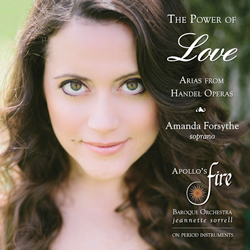
Arias from nine operas are featured in this collection, plus four wildly contrasting orchestral movements from Terpsichore (Il Pastor fido) — a graceful chaconne, a skittering entrée depicting jealousy, a delightful air, and a ballo for recorders and violins. Those interludes give Forsythe a virtual breather between her exhausting representations of the many emotions of a soprano in love (now she’s like a butterfly hovering around a lamp, now she’s a calculating temptress, now she’s a cruel traitor, finally, she’s a shattered ship reaching safe harbor).
Amanda Forsythe is simply astonishing in her vocal acrobatics, most impressively in the aria “Tornami A Vaghegglar” from Alcina, bedecked with dazzling melismas and ornaments. Jeannette Sorrell and Apollo’s Fire are sensitive and attentive partners, and outstanding solo work comes from oboist Debra Nagy, traverso Kathie Stewart, and bassoonist Nate Helgeson. Simon Martyn-Ellis provides variety from time in the continuo department on guitar and theorbo. — Daniel Hathaway
Sugarloaf Mountain: An Appalachian Gathering. Apollo’s Fire, Jeannette Sorrell, conducting (Avie).
This CD was reviewed in June, 2015 by Daniel Hathaway.
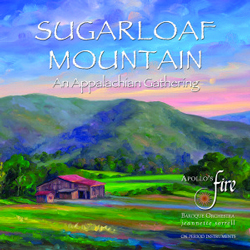
The new CD preserves last summer’s countryside concerts (“Glory on the Mountain”) under a new title. Once again, Jeannette Sorrell has gathered a splendid crew of singers and instrumentalists, including vocalists Amanda Powell and Ross Hauck, violinist (a.k.a. fiddler) Susanna Perry Gilmore, wooden-flute player Kathie Stewart, lutenist, guitarist, long-neck dulcimer player and vocalist Brian Kay, cellist René Schiffer, and hammered dulcimer player Tina Bergmann. While nobody would mistake this sophisticated, super-educated ensemble for a folk group, they wear their erudition lightly and take up their folksy material with infectious enthusiasm. — Daniel Hathaway (read the review here).
The Reckless Heart: Kendra Colton, soprano, Kayo Iwama, piano (Oberlin Music).
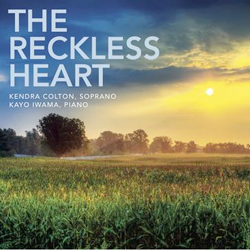
The well-constructed program is fleshed out with Samuel Barber’s Hermit Songs (“a sentimental favorite,” Colton writes), Ivor Gurney’s Elizabethan Songs, Benjamin Britten’s first song cycle, On This Island (to poems by W.H. Auden), and two contrasting settings of W.B. Yeats’s Down by the salley gardens by Gurney and Britten (tucked in between like encores-before-the-fact).
Kendra Colton’s clear, alluring voice and her flair for communicating words are well-matched to this repertoire. Barber’s clever settings of medieval Irish poems almost sing themselves, but Andy Vores’s idiosyncratic settings of words by five different poets are more difficult to put across. Colton makes a fine case for the title track cycle, and elsewhere, she lifts Gurney’s settings out of their somewhat stuffy Edwardian context.
The CD ends with Britten’s On This Island. His musical versions of poems reflecting Auden’s disillusionment with British society in the 1930s give an early glimpse into the composer’s brilliance at songwriting, and Colton and Iwama bring them vividly to life.
Which of the two “Salley Gardens” settings would you choose? Britten wins our vote: it’s as simple and perfect as similar Schubert songs, and Colton makes a subtle change of mood for its second verse.
One caveat: the recording slightly favors the piano over the voice. If anything, it should be the other way around. — Daniel Hathaway
Retrophonic Gershwin: Joan Ellison & Mark Flanders, vocals, with duo-pianists Jason Aquila & Jodie Ricci (Joan Ellison).
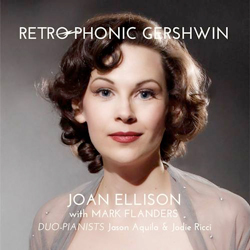
Thus Retrophonic Gershwin draws on the content and vocal stylings preserved on vintage recordings, “everything from inspiration to note-for-note transcriptions,” but also enjoys the state-of-the-art studio amenities of Clonick Hall at Oberlin, where Ellison took her bachelor’s and master’s degrees (she now teaches at the Cleveland Institute of Music).
Ellison’s partners-in-time-travel are vocalist Mark Flanders and duo-pianists Jason Aquila and Jodie Ricci, who collectively channel the spirit and style of such Gershwin landmarks as “I Got Rhythm,” “A Foggy Day,” and “The Man I Love” in a twelve-track performance that’s on the short side in duration (only 36 minutes) but packs in a lot of fine singing and piano playing. The songs may be retro, but Ellison and Flanders make them sound fresh and new.
At the top of the album, Aquila and Ricci join their four hands in a pastiche of Gershwin tunes dubbed “Syncopated City Overture.” Elsewhere they provide lively support to Ellison and Flanders in arrangements sometimes busy enough that, amazingly, they sound like a player piano. — Daniel Hathaway
My Favorite Things: Liz Huff and friends (BossyCatMusic).
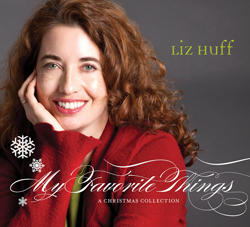
Pianists Jordan Cooper and Marshall Griffith, classical guitarist Robert Gruca, drummer Justin Hart, violinist Ariel Clayton Karas, bassist Tim Keo, electric guitarist Brian Mueller, and flutist Linda White — many of whom share Cleveland Institute of Music ties with Huff — join in the lovely, sometimes striking arrangements.
There’s something for everyone here. Huff’s laid-back, intimate singing adds a new flavor to commercial Christmas music, even to the ubiquitous Little Drummer Boy and Have Yourself a Merry Little Christmas. On the more classical side of the repertoire, carols like Gustav Holst’s In the Bleak Midwinter receive haunting treatment with the stark accompaniment of multi-tracked flutes. — Daniel Hathaway
The Land of Harmony: American Choral Gems from the Bay Psalm Book to Amy Beach. Quire Cleveland, Ross W. Duffin, conducting (Quire).
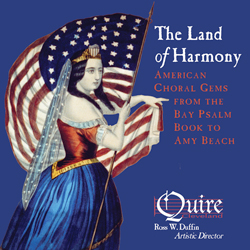
The CD, recorded live by Thomas Knab at Quire’s performance at St. Peter’s Church in downtown Cleveland on April 6, 2014, archives this fascinating repertoire and captures the spontaneity and audience engagement that can only be present in a live performance. Sometimes the church’s acoustics embrace the choral sound with a nimbus more appropriate to a cathedral than to a New England meeting house, but the singing is vital, clear, and elegantly tuned and blended.
Duffin wisely showcased women’s and men’s voices separately late in the concert. Amy Beach’s Though the house give glimmering light and Patty Stair’s So sweet is she provided lovely changes of timbre. — Daniel Hathaway (read the concert review here).
Published on ClevelandClassical.com December 17, 2015.
Click here for a printable copy of this article



